A current question: What is STS? A Report on the 2022 STS Turkey Conference
Ayşe Ayda Gerçek and Ilgın İrem Gündüz
February 27, 2023 | Report-Backs
Please scroll down for the Turkish translation of the report.
Science and Technology Studies Turkey Research Network (STS TURKEY), established in 2017, gathered together for the annual conference at Istanbul Bilgi University on 24-25 November 2022. How is knowledge built? How does technology evolve? How has the diffusion of knowledge changed with technology? In Turkey, where there is overwhelming contestation over the production and dissemination of knowledge, scientific and otherwise, STS provides a refreshing platform to engage with various disciplines that share similar outlooks. This makes it all the more important to adopt inter- and transdisciplinary perspectives and to think outside the box. In this respect, the conference brought together participants from many disciplines and created a safe environment for discussions.
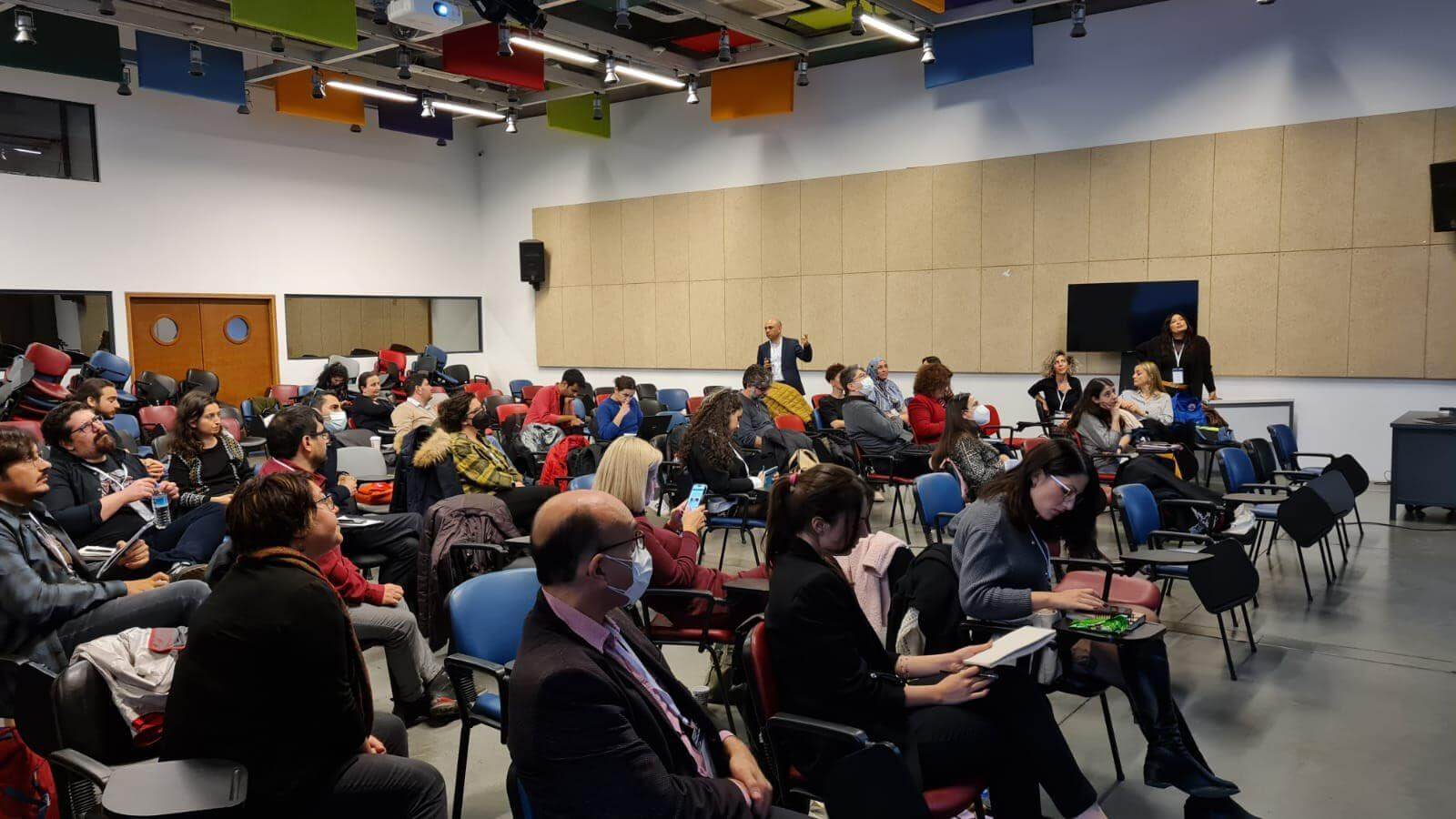
Özgür Kadir Özer, while explaining how the literature on the COVID-19 pandemic has evolved, with his bibliometric study
Contentions over Science, Technology and Society
Given the global crisis of democracy, it was not surprising that a session on “Science and Technology Policies” engaged with issues of democratization and the increasing participation in technological decision-making. Case studies on Quantum technologies and process mining were presented, which led to a discussion on the role of participatory politics in innovation policy. Addressing the theme on a different scale, the following presentation analyzed the societal aspects of mission-driven innovation in Japan, with a focus on Japan’s Society 5.0. The session concluded with remarks on sociotechnical imaginaries, where presenters suggested new ways of looking back, from the futurists to Gaston Bachelard, to imagine new futures.
The “Society and Perception of Technology” session delved into heated debates surrounding the definition of technology. The speakers examined a range of topics – from the right-to-repair movement to science-fictional depictions of the digital society, kids’ experiences with AI, and the shifting attitudes toward evolution in Turkey. The subsequent discussion addressed how these debates reflect and even exacerbate existing societal divides, with a particular focus on the intersection of gender and religion in shaping technology perception in Turkey.
Imagining Feminist Technologies
Inspired by the emphasis in STS on making and doing, “Artistic Imagination: Woman, Health and Technology” workshop looked into the cyclical dynamic between the (female) body and technology. Through a phenomenological approach, the organizers investigated how femtech (female technologies) mediates the experiences of women as they navigate social, medical and political institutions and services. The participants were handed informative cards detailing each femtech application, and were challenged to reflect critically on how these technologies could improve women’s lives. The discussion tackled an urgent topic: whether these technologies could be successfully implemented in other settings, given their unique societal dynamics. With the rising domestic violence and femicide in Turkey, the group honed in on the crucial issues of privacy and safety of femtech users. They emphasized the importance of understanding local dynamics and the potential uses and abuses of femtech to ensure it is used for good, rather than causing harm. The workshop concluded with a call to action: engaging with local dynamics is crucial for the successful and responsible use of femtech.
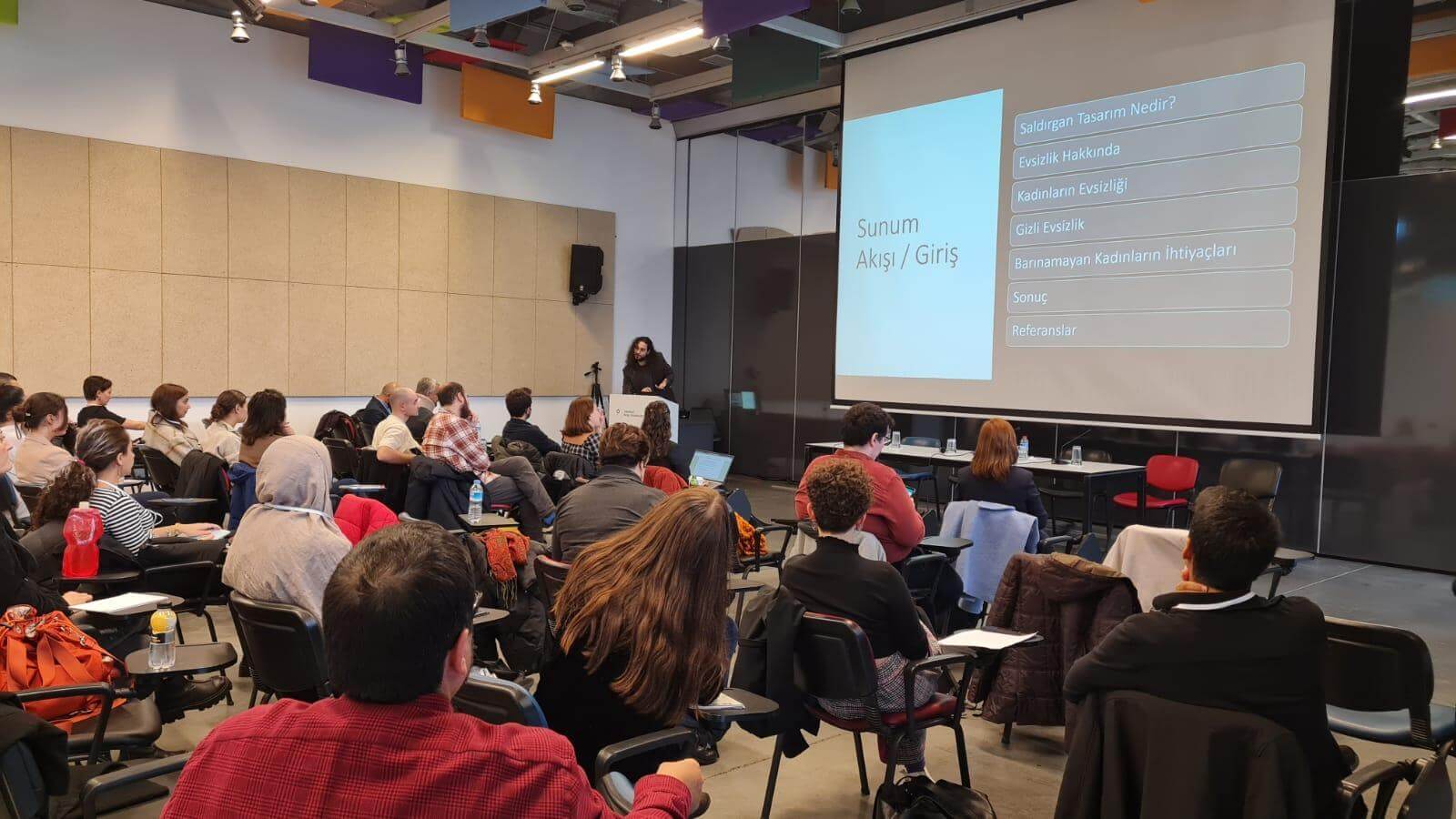
With an emphasis on hostile design, Mert Akol discusses how homelessness is experienced by women.
The session “Design, New Media, and Technology” highlighted the impact of design on societal behavior patterns. Presenters showed how technological design mediates social experience through various case studies ranging from aggressive design (anti-homeless architecture) and gender to virtual meeting platforms. The use of technology and design to mediate social experience was a central theme in all discussions, particularly in relation to the pressing issues of homelessness and gender inequality. There was an emphasis on how materiality, politics and practice of design are entangled. These concerns were reflected in an analysis of social media platforms and the formation and measurement of public opinion. The power of social media in forming public opinion and its metrics sparked the audience’s interest as Turkey prepares to hold general elections in 2023.
Reclaiming Hydrogen
The day ended with a special session on hydrogen where presenters, using actor-network theory, analyzed hydrogen as a social entity/actant. We approached hydrogen as part of a multispecies network of human and non-human agents – natural, human-made, living or non-living – the primary agent remaining the hydrogen molecule itself. Given the escalating interest in hydrogen as a potential energy source in Turkey, the session wrapped up with the consensus that the non-scientific and hybrid features of hydrogen should also be taken into account in these studies.
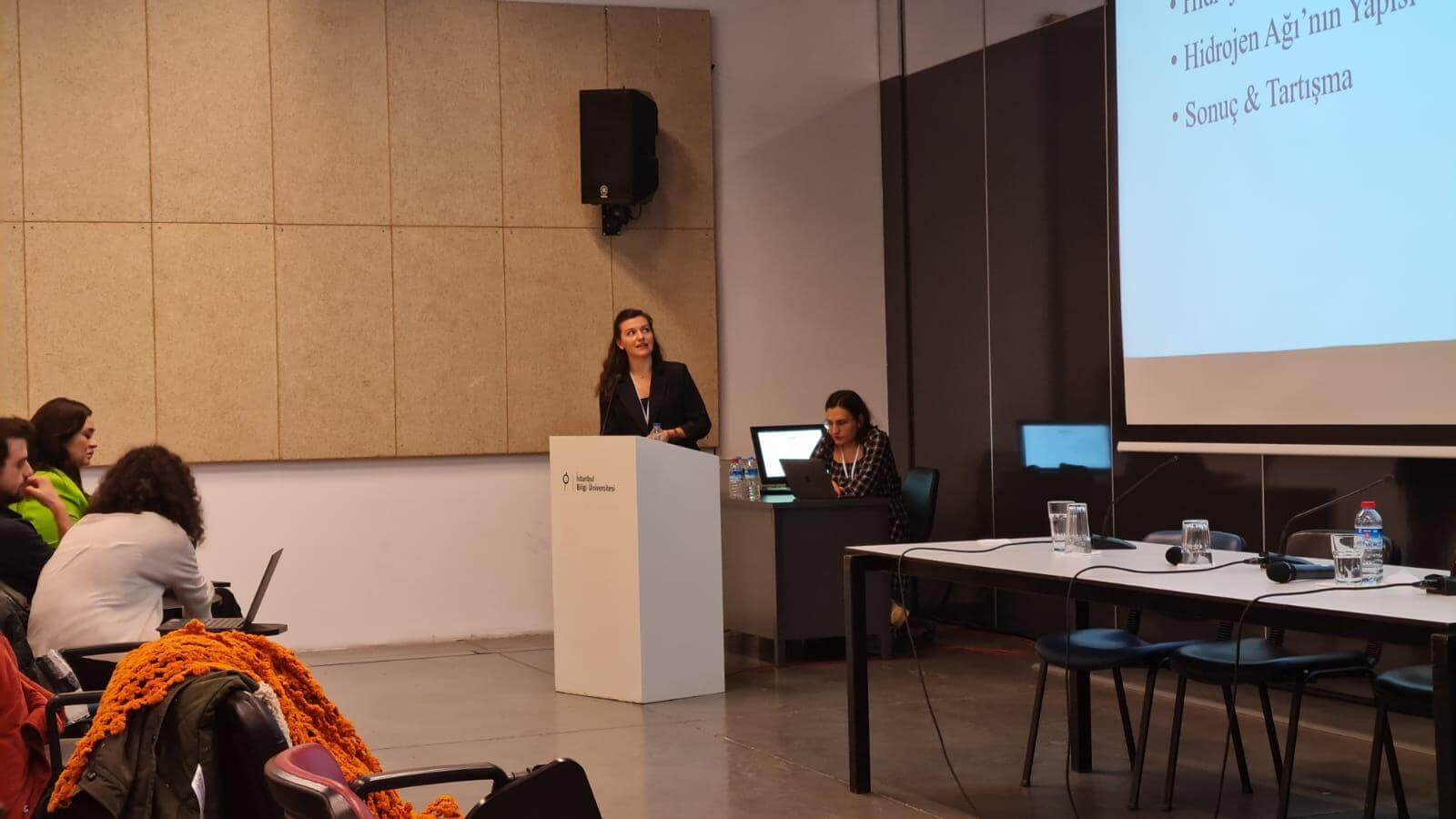
Ayda and Ilgın, conveying the conclusion of the special session titled Hydrogen and Actor Network Theory with their collaborative contribution
Communication and Expertise in Science and Technology
The second day kicked off with a workshop on science communication led by the NETlab of Ankara University. Participants were introduced to the basics of science communication and presented with several projects, including a captivating demonstration on how 360-degree video display can be used to communicate scientific knowledge. The participants learned how the NetLab platform and various digital tools can support researchers in their work and help them share their findings with the public.
The afternoon sessions shifted the focus to exploring the relationship between science and society. A session on the history and philosophy of science tackled important questions such as the role of scientists in knowledge production, the subjectivity involved in the process, and the impact of digital data on scientific knowledge. Given the continuous growth of technology, the group discussed the developments’ potential impact on traditional, uncodified knowledge and the importance of reflexivity in the knowledge production.
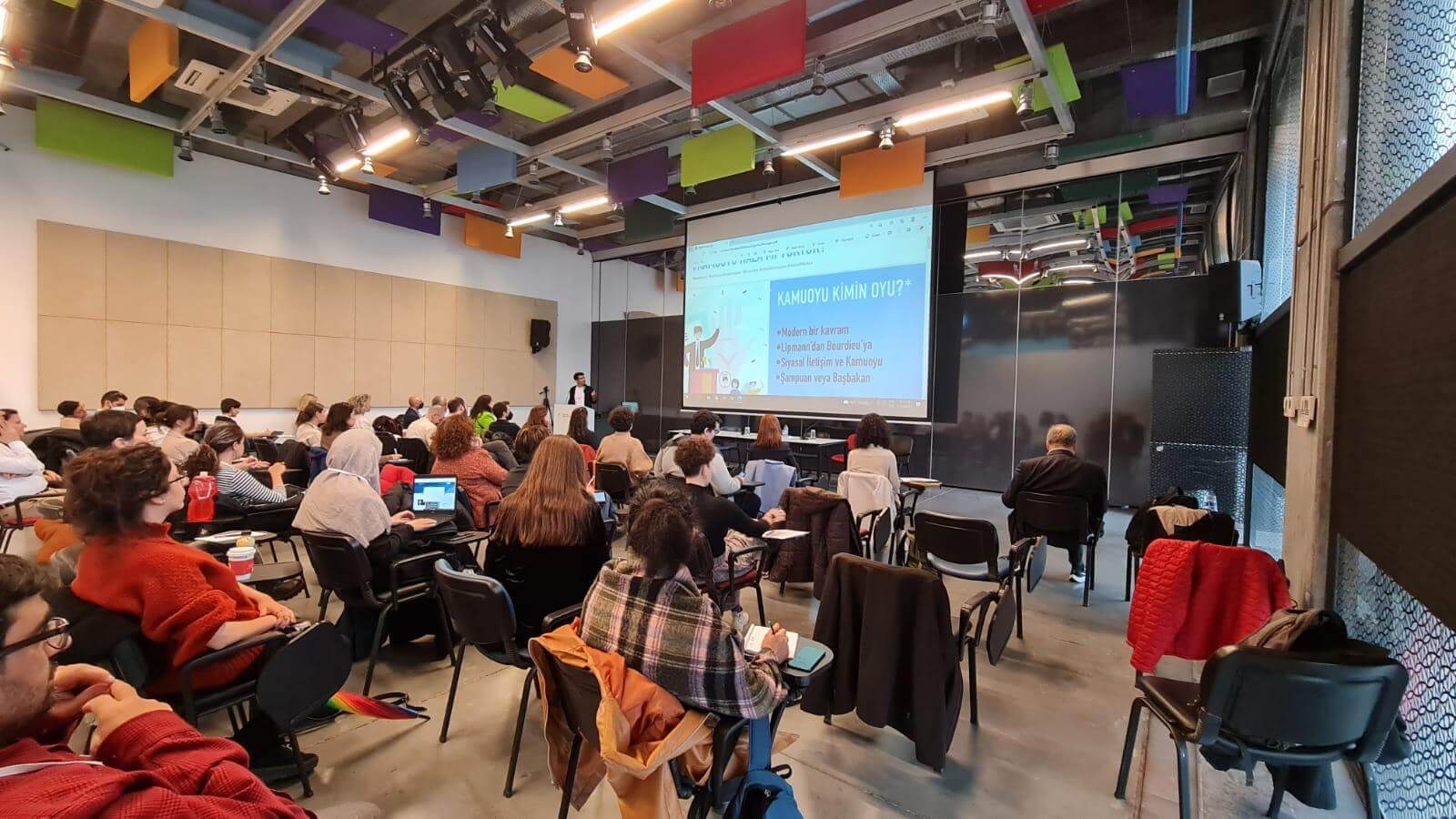
Uğur Kocager and his presentation entitled "@Bourdieu, Is the #Public Still Out?”, which provokes the audience to consider the effect of social media in the creation of public opinion
In a parallel session, the focus was on the role of expertise in STS studies. A comparative study of pilots and surgeons led to discussions on tacit knowledge and what constitutes the boundaries of expertise under increasing automation. A study on users of a nutrition app argued that rather than a unilaterally deterministic technology-human relationship, design should be participatory and take into account the interrelatedness of all social processes. The session wrapped up with a thought-provoking discussion on the significance of bibliometric studies in the field of STS. With the growing impact of technology on our lives, these discussions reveal crucial questions about how we view and communicate science, and how society can engage with science in a meaningful way.
Health and Illness in a Post-Covid World
The next session on health and society focused on the COVID-19 pandemic, with discussions centered on the impact of the virus on both scientific research and the public’s trust. One thought-provoking talk delved into the ethical challenges faced in intensive care units and the moral dilemma surrounding end-of-life decisions, with a focus on the Turkish context. The discussion sparked heated debates on the ongoing challenges faced by medical professionals and families in navigating these difficult circumstances. Religious and cultural values in Turkey play a significant role in shaping the public’s understanding and acceptance of end-of-life practices, making it a crucial topic for further exploration. The session ended with a presentation on a national health platform, namely E-Pulse, where corporal data is recorded, processed, and stored in a cloud. The following discussion explored questions of the politics of health technologies that lead to new forms of social, political and economic engagements. With the ongoing COVID-19 crisis, these debates take on added urgency, as people around the world continue to grapple with the complexities of navigating a pandemic.
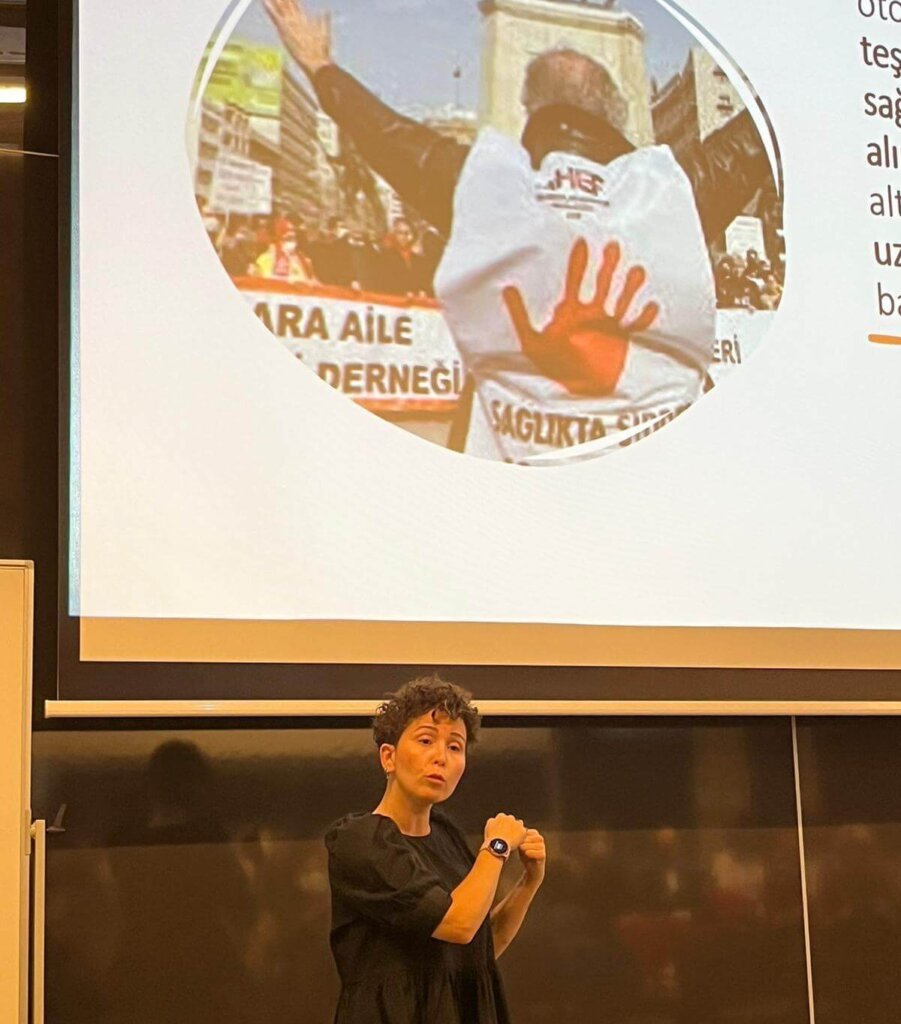
Ezgi Pehlivanlı discusses the subject of anti-vaccination, which became even more visible with the Covid-19 pandemic in the context of Turkey
The last conference session tackled a vital issue in contemporary Turkey: the impact of technology on society and work. The first presentation brought in the work of two renowned STS scholars, Bruno Latour and David Bloor, to examine the limits of a unified approach to STS. The following talk delved into the economic and social effects of automation and how it’s redefining the concept of work. The Turkish government has launched initiatives to promote automation – such as tax incentives for companies investing in automation technologies and providing training for workers to develop the necessary skills. However, automation also raises concerns about job loss and its impact on the country’s workforce. The conference wrapped up with a critical take on the field of Energy Science and Technology, where the presenter offered an STS angle to the field’s socio-technical conceptualization of energy.
Next year the conference will take place in Ankara. We invite interested scholars to stay in touch and check for updates on the website.
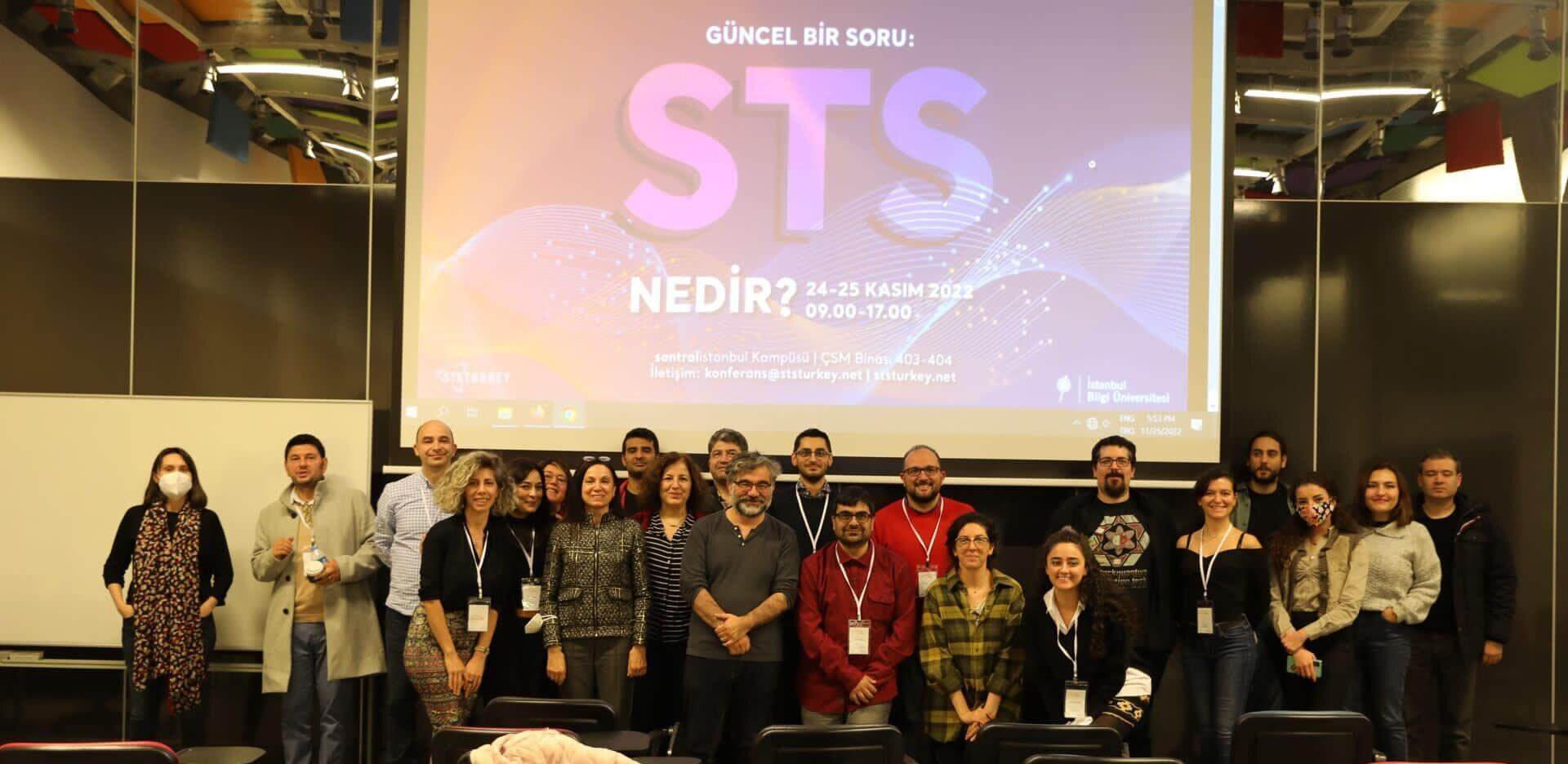
You can access the conference program (Turkish) here, and the conference booklet with abstracts (Turkish) here.
Ayşe Ayda Gerçek has completed her undergraduate degree in sociology in 2021. She is currently a graduate student in Science and Technology Policy department at Middle East Technical University, shaping her master’s thesis in the area of social acceptance of renewable energy technologies.
Ilgın İrem Gündüz graduated from Middle East Technical University, Department of Political Science and Public Administration. She is currently obtaining her master’s degree in Science and Technology Policy Studies at the Social Sciences Institute at METU. Her research topics include renewable energies, solar energy, hydrogen, sustainability, storage technologies and their policies.
Güncel Bir Soru: STS Nedir?
STS Türkiye Konferans Raporu-2022
2017 yılında kurulan Bilim ve Teknoloji Çalışmaları Türkiye Araştırma Ağı (STS TÜRKİYE), 24-25 Kasım 2022 tarihlerinde İstanbul Bilgi Üniversitesi'nde düzenlenen yıllık konferans için bir araya geldi.Bilgi nasıl inşa edilir? Teknoloji nasıl gelişir? Bilginin yayılması teknoloji ile nasıl değişti? Bilimsel veya başka türlü bilginin üretimi ve yayılması konusunda ezici bir çekişmenin olduğu Türkiye'de STS, benzer bakış açılarını paylaşan çeşitli disiplinlerle ilişki kurmak için canlandırıcı bir platform sağlar. Bu, disiplinler arası bakış açılarını benimsemeyi ve kalıpların dışında düşünmeyi çok daha önemli hale getiriyor. Bu amaçla birçok disiplinden katılımcıyı bir araya getiren bu konferans, güvenli ve rahat bir tartışma ortamı yaratmıştır.Resim 1. Özgür Kadir Özer, COVID-19 pandemisi ile ilgili literatürün nasıl geliştiğini bibliyometrik çalışmasıyla anlatırken
Demokrasi ve Teknolojinin Geleceği
Küresel demokrasi krizi göz önüne alındığında, “Bilim ve Teknoloji Politikaları” içerikli oturumun demokratikleşme ve teknolojik karar alma süreçlerine artan katılım konularını ele alması şaşırtıcı değildi. Oturumda sunulan kuantum teknolojileri ve süreç madenciliği vaka çalışmaları, katılımcı politikaların inovasyon politikasındaki rolü üzerine bir tartışmayı da beraberinde getirdi. Temayı farklı bir ölçekte ele alan sonraki sunum, Japonya'nın Toplum 5.0 programına odaklanarak Japonya'daki misyon odaklı inovasyonun toplumsal yönlerini analiz etti. Oturum, sosyoteknik tahayyüller üzerine açıklamalarla sona erdi ve sunucular, yeni gelecekler hayal etmek için fütüristlerden Gaston Bachelard'a kadar, geriye bakmanın yeni yollarını önerdiler.
Bilim ve teknoloji üzerine tartışmalar
"Toplum ve Teknoloji Algısı" oturumunda, teknolojinin tanımı etrafında hararetli tartışmalara geçildi. Konuşmacılar, onarım hakkı hareketinden dijital toplumun bilim kurgu tasvirlerine, çocukların yapay zeka ile deneyimlerinden Türkiye'de evrime karşı değişen tutumlara kadar bir dizi konuyu incelediler. Takip eden soru-cevap kısmı, bu tartışmaların mevcut toplumsal ayrımları nasıl yansıttığı ve hatta şiddetlendirdiği etrafında gelişirken, özellikle Türkiye'de teknoloji algısının şekillenmesinde toplumsal cinsiyet ve dinin kesişimine odaklandı.
Feminist Teknolojileri Hayal Etmek
STS’ten ilham alan "Sanatsal Hayal Gücü: Kadın, Sağlık ve Teknoloji" atölyesi (kadın) bedeni ile teknoloji arasındaki döngüsel dinamiği inceledi. Fenomenolojik bir yaklaşımla organizatörler, femtech'in (kadın teknolojileri) kadınların sosyal, tıbbi ve politik kurumlar ve hizmetlerle olan etkileşimlerine nasıl aracılık ettiğini araştırdı. Katılımcılara her bir femtech uygulamasını detaylandıran bilgilendirici kartlar verildi ve bu teknolojilerin kadınların yaşamlarını nasıl iyileştirebileceği konusunda eleştirel bir bakış açısı geliştirmeleri istendi. Bunu, benzersiz toplumsal dinamikler göz önüne alındığında bu teknolojilerin başka ortamlarda başarılı bir şekilde uygulanıp uygulanamayacağı konusunda bir tartışma takip etti. Grup, Türkiye'de artan aile içi şiddet ve kadın cinayetleriyle de bağlantılı olarak, femtech kullanıcılarının mahremiyeti ve güvenliği gibi hayati konulara odaklandı. Bu bağlamda, yerel dinamikleri ve femtech kullanımının potansiyel fayda ve risklerini anlamanın, bu teknolojilerin kadınların yararına kullanımını sağlamadaki önemine dikkat çekildi. Çalıştay, femtech'in başarılı ve sorumlu kullanımı için yerel dinamiklerle ilişki kurmanın çok önemli olduğu mesajı ile sona erdi.
Resim 2. Mert Akol, evsizliğin kadınlar tarafından nasıl deneyimlendiğini düşmanca tasarım vurgusu üzerinden tartışıyor.
“Tasarım, Yeni Medya ve Teknoloji” oturumu, dijital ve materyal tasarımın toplumsal davranış kalıpları üzerindeki etkisini vurguladı. Sunucular, teknolojik tasarımın sosyal deneyime nasıl aracılık ettiğini, düşmancıl tasarım (evsizliğe karşı mimari) ve toplumsal cinsiyetten sanal toplantı platformlarına kadar uzanan çeşitli vaka incelemeleri ile ortaya koydular. Teknoloji ve tasarımın sosyal deneyime aracılık etmek için kullanımı ve özellikle evsizlik ve toplumsal cinsiyet eşitsizliği sorunlarıyla ilişkisi, bu tartışmalarda merkezi bir konumdaydı. Materyalliğin, politikanın ve tasarım pratiğinin nasıl birbirini beslediği vurgulandı. Bu endişeler, sosyal medya platformlarının analizi ve kamuoyu oluşturulması ve ölçülmesi konularına yansıdı. Türkiye 2023 genel seçimlerine hazırlanırken, sosyal medyanın kamuoyu oluşturmadaki gücü ve ölçütleri izleyicilerin ilgisini çekti.
Tasarım Yoluyla Dışlama
“Tasarım, Yeni Medya ve Teknoloji” oturumu, dijital ve materyal tasarımın toplumsal davranış kalıpları üzerindeki etkisini vurguladı. Sunucular, teknolojik tasarımın sosyal deneyime nasıl aracılık ettiğini, düşmancıl tasarım (evsizliğe karşı mimari) ve toplumsal cinsiyetten sanal toplantı platformlarına kadar uzanan çeşitli vaka incelemeleri ile ortaya koydular. Teknoloji ve tasarımın sosyal deneyime aracılık etmek için kullanımı ve özellikle evsizlik ve toplumsal cinsiyet eşitsizliği sorunlarıyla ilişkisi, bu tartışmalarda merkezi bir konumdaydı. Materyalliğin, politikanın ve tasarım pratiğinin nasıl birbirini beslediği vurgulandı. Bu endişeler, sosyal medya platformlarının analizi ve kamuoyu oluşturulması ve ölçülmesi konularına yansıdı. Türkiye 2023 genel seçimlerine hazırlanırken, sosyal medyanın kamuoyu oluşturmadaki gücü ve ölçütleri izleyicilerin ilgisini çekti.
Resim 3. Ayda ve Ilgın, ortak katkılarla oluşan Hidrojen ve Aktör Ağ Teorisi başlıklı özel oturumun sonucunu aktarıyorlar.
Bilim ve Teknolojide Değişen Uzmanlık Biçimleri
Paralel oturumda, STS çalışmalarında uzmanlığın rolü üzerinde duruldu. Pilotlar ve cerrahlar üzerine yapılan karşılaştırmalı bir çalışma, örtük (tacit) bilgi ve artan otomasyon altında uzmanlığın sınırlarını neyin oluşturduğu üzerine tartışmalara yol açtı. Bir beslenme uygulamasının kullanıcıları üzerinde yapılan bir araştırma, tasarımın tek taraflı ve deterministik bir teknoloji-insan ilişkisinden ziyade katılımcı olması, tüm sosyal süreçlerin birbiriyle ilişkisini hesaba katması gerektiğini savundu. Oturum, STS alanında bibliyometrik çalışmaların önemi üzerine düşündürücü bir tartışma ile sona erdi. Teknolojinin günlük hayatımızdaki artan etkisiyle, bu tartışmalar bilimi nasıl gördüğümüz ve ilettiğimiz konularının yanısıra, toplumun bilimle nasıl anlamlı bir ilişki kurabileceğine dair önemli sorulara ışık tutmaya yardımcı oldu.
Resim 4. Uğur Kocager, "@Bourdieu, #Kamu Hala Dışarıda mı?" başlıklı sunumuyla izleyicileri sosyal medyanın kamuoyu oluşturmadaki etkisini düşünmeye sevk ediyor.
Paralel oturumda, STS çalışmalarında uzmanlığın rolü üzerinde duruldu. Pilotlar ve cerrahlar üzerine yapılan karşılaştırmalı bir çalışma, örtük (tacit) bilgi ve artan otomasyon altında uzmanlığın sınırlarını neyin oluşturduğu üzerine tartışmalara yol açtı. Bir beslenme uygulamasının kullanıcıları üzerinde yapılan bir araştırma, tasarımın tek taraflı ve deterministik bir teknoloji-insan ilişkisinden ziyade katılımcı olması, tüm sosyal süreçlerin birbiriyle ilişkisini hesaba katması gerektiğini savundu. Oturum, STS alanında bibliyometrik çalışmaların önemi üzerine düşündürücü bir tartışma ile sona erdi. Teknolojinin günlük hayatımızdaki artan etkisiyle, bu tartışmalar bilimi nasıl gördüğümüz ve ilettiğimiz konularının yanısıra, toplumun bilimle nasıl anlamlı bir ilişki kurabileceğine dair önemli sorulara ışık tutmaya yardımcı oldu.
Post-Covid Dünyada Sağlık ve Hastalık
Sağlık ve toplum konulu bir sonraki oturum, virüsün hem bilimsel araştırma hem de halkın güveni üzerindeki etkisine odaklanan tartışmalarla COVID-19 pandemisini ele aldı. Oturumdaki bir çalışma, yoğun bakım ünitelerinde karşılaşılan etik zorlukları ve yaşam sonu kararlarını çevreleyen ahlaki ikilemi Türkiye bağlamına odaklanarak tartıştı. Sunum, tıp uzmanları ve beraberinde ailelerinin karşılaştıkları süregelen zorluklar hakkında hararetli tartışmalara yol açtı. Türkiye'deki dini ve kültürel inançlar, toplumun yaşam sonu uygulamalarını anlama ve kabul etmede önemli bir rol oynamakta ve bu konudaki araştırma ihtiyacını ivedi kılmaktadır. Sorunu daha üst ölçekte ele alan bir sonraki tartışma, yeni sosyal, politik ve ekonomik angajman biçimlerine yol açan sağlık teknolojileri politikalarına ilişkin sorulara değindi. Devam eden COVID-19 kriziyle birlikte, dünyanın dört bir yanındaki insanlar bir pandemide yön bulmanın karmaşıklığıyla boğuşmaya devam ederken, bu tartışmaların artarak aciliyet kazandığı ortaya çıktı. Oturum, kurumsal verilerin kaydedildiği, işlendiği ve bulutta saklandığı ulusal sağlık platformu E-Nabız'a ilişkin sunumla sona erdi.
Resim 5. Ezgi Pehlivanlı, KOVİD-19 ile birlikte daha da görünür hale gelen aşı karşıtlığını Türkiye bağlamında tartışıyor.
Konferansın son oturumunda, günümüz Türkiye'sinde hayati bir konu olan teknolojinin toplum ve iş üzerindeki etkisi ele alındı. İlk sunum, STS'ye birleşik bir yaklaşımın sınırlarını incelemek için iki ünlü STS akademisyeni, Bruno Latour ve David Bloor'un çalışmalarını gündeme getirdi. Sonraki sunum, otomasyonun ekonomik ve sosyal etkilerini ve iş kavramını nasıl yeniden tanımladığını ele aldı. Türk hükümetinin, otomasyon teknolojilerine yatırım yapan şirketler için vergi teşvikleri ve gerekli becerileri geliştirmek için çalışanlara eğitim sağlanması gibi, otomasyonu teşvik edici girişimler başlattığı belirtildi. Bununla birlikte, otomasyonun aynı zamanda iş kaybı ve bunun ülkenin işgücüne etkisi ile ilgili endişeleri de artırdığına değinildi. Konferansın son sunumu, Enerji, Bilim ve Teknoloji alanının yapısal bir analizi ile teknolojinin toplum üzerindeki etkisini anlamak için pratik bir mercek sağladı.
Gelecek yıl konferansın Ankara'da yapılması planlanıyor. İlgilenen akademisyenleri iletişimde kalmaya ve web sitesindeki güncellemeleri kontrol etmeye davet ediyoruz.
Programın tamamına buradan, özetli konferans kitapçığına da buradan erişebilirsiniz.
Ayşe Ayda Gerçek, 2021 2021 yılında sosyoloji lisans eğitimini tamamlamıştır. Halen Orta Doğu Teknik Üniversitesi Bilim ve Teknoloji Politikası bölümünde yüksek lisans öğrencisi olup, yüksek lisans tezini yenilenebilir enerji teknolojilerinin toplumsal kabulü alanında şekillendirmektedir.
Ilgın İrem Gündüz, Orta Doğu Teknik Üniversitesi Siyaset Bilimi ve Kamu Yönetimi Bölümü'nden mezun olduktan sonra ODTÜ Sosyal Bilimler Enstitüsü'nde Bilim ve Teknoloji Politika Çalışmaları alanında yüksek lisans yapmaktadır. Araştırma konuları yenilenebilir enerjiler, güneş enerjisi, hidrojen, sürdürülebilirlik, depolama teknolojileri ve politikalarıdır.
Published: 02/27/2023
